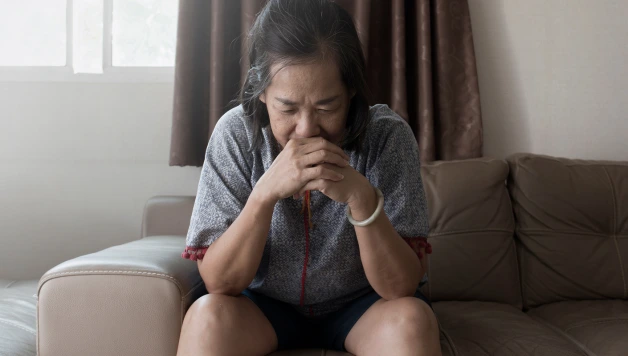Menopause, Mental Health and Hot Flashes
Mental health is an essential aspect to consider during the menopause phase. But what is the relationship between Menopause, mental health, and hot flashes? In this article, we will explore this connection. Moreover, we’ll understand how your mental well-being can influence the occurrence and intensity of hot flashes.
Additionally, we will provide valuable insights and practical strategies to manage your mental health and hot flashes during this transformative stage.
Menopause and Mental Health
Menopause is intricately connected with mental health in several ways. Let’s explore this relationship in detail:
Hormonal fluctuations:
The levels of estrogen and progesterone, i.e., the primary female hormones, undergo significant fluctuations during Menopause. Estrogen plays an essential role in regulating mood and emotional well-being.
Psychological symptoms:
Menopause can give rise to a range of psychological symptoms due to hormonal imbalances. That is to say:
- Hormonal fluctuations can lead to sudden changes in mood, causing emotional instability.
- Fluctuating hormone levels can contribute to unease, worry, and restlessness.
- Menopause increases the risk of developing depression or exacerbates existing depressive symptoms.
Sleep disturbances:
Hormonal changes during Menopause can disrupt sleep patterns, leading to sleep disturbances. In other words, night sweats and hot flashes can interrupt sleep, resulting in sleep deprivation and fatigue. Furthermore, sleep disturbances can affect mood changes and overall mental health.
Impact on cognitive function:
Menopause can affect cognitive function, including memory and concentration. Some women may experience difficulty focusing or remembering information during this time.
The Impact of Menopause on Hot Flashes:
Hot flashes, characterised by sudden and intense sensations of heat, are a common symptom of Menopause. Hot flashes are closely connected to hormonal changes, particularly the decline in estrogen levels. The decrease in estrogen affects the body’s temperature regulation, leading to hot flashes. Subsequently, hot flashes can cause anxiety and distress and disrupt daily activities due to their sudden onset and intensity.
Sleep disturbances caused by night sweats and hot flashes can lead to fatigue, irritability, difficulty concentrating and memory.
The Bidirectional Relationship: Menopause and Mental Health
Menopause affects mental health, increasing the risk of mood disorders such as depression and anxiety. Let’s understand the bidirectional relationship through a few points:
- Hormonal imbalances disrupt mood regulation and neurotransmitter function, impacting emotional well-being.
- Psychological symptoms and physical discomfort during Menopause contribute to emotional distress.
Meanwhile, Mental health also influences menopause symptoms and their management:
- High stress and anxiety levels can worsen the frequency and severity of hot flashes.
- Emotional resilience and positive coping strategies can mitigate the impact of menopause symptoms.
Managing Menopause-related Mental Health Challenges:
Understanding and effectively managing menopause-related mental health challenges is crucial for women to maintain a positive quality of life during this significant life stage. Here are some tips:
Engage in regular exercise for mental well-being:
Regular exercise is particularly beneficial for managing mood and reducing anxiety during Menopause. The hormonal changes that occur during this phase can contribute to feelings of irritability, mood swings, and increased anxiety levels. However, physical activity can help alleviate these symptoms and support mental well-being.
Maintain a balanced diet:
Maintaining a balanced diet that includes fruits, vegetables, and whole grains is crucial for supporting brain health and stabilizing mood, especially during Menopause. Our plate can significantly impact our mental well-being and help manage the hormonal fluctuations and emotional challenges accompanying this stage of life.
Practice stress management techniques to promote mental health:
Practicing meditation, yoga, and mindfulness can be highly beneficial for alleviating anxiety and promoting mental well-being during Menopause. These techniques can help calm the mind, reduce stress, and improve overall emotional balance.
Seek cognitive-behavioural therapy (CBT):
Seeking cognitive-behavioural therapy (CBT) can be highly beneficial for improving mental well-being during Menopause. CBT focuses on identifying and modifying negative thought patterns and behaviors contributing to emotional distress.
Explore mindfulness-based stress reduction (MBSR) techniques:
Exploring mindfulness-based stress reduction (MBSR) techniques can be highly beneficial for promoting mental well-being during Menopause. MBSR combines mindfulness meditation, body awareness, and gentle yoga to help individuals manage stress, reduce anxiety, and cultivate greater well-being.
Consider hormone replacement therapy (HRT):
Hormone replacement therapy (HRT) can be considered under the guidance of a healthcare provider for severe menopause symptoms. This therapy involves using medications containing hormones, such as estrogen, progesterone, or both sometimes, to supplement the body’s declining hormone levels during Menopause. By discussing your symptoms with a healthcare provider, you can explore HRT’s potential benefits and risks as a treatment option.
Explore alternative therapies for mental well-being:
In addition to conventional approaches, explore complementary and alternative therapies, such as herbal supplements, yoga or acupuncture, as additional support for menopause-related mental health challenges.
Conclusion:
Menopause brings significant changes to both the body and mind. Understanding the connection between Menopause and mental health is crucial for women undergoing this transformative phase. Hormonal fluctuations, psychological symptoms, and the impact of hot flashes are intertwined, emphasising the importance of addressing mental health and well-being during Menopause.
By adopting lifestyle modifications, seeking professional support, and exploring therapeutic options, women can effectively manage menopause-related mental health challenges and enhance overall well-being. With the right strategies, you can navigate Menopause with resilience and embrace the possibilities beyond this transformative journey.









